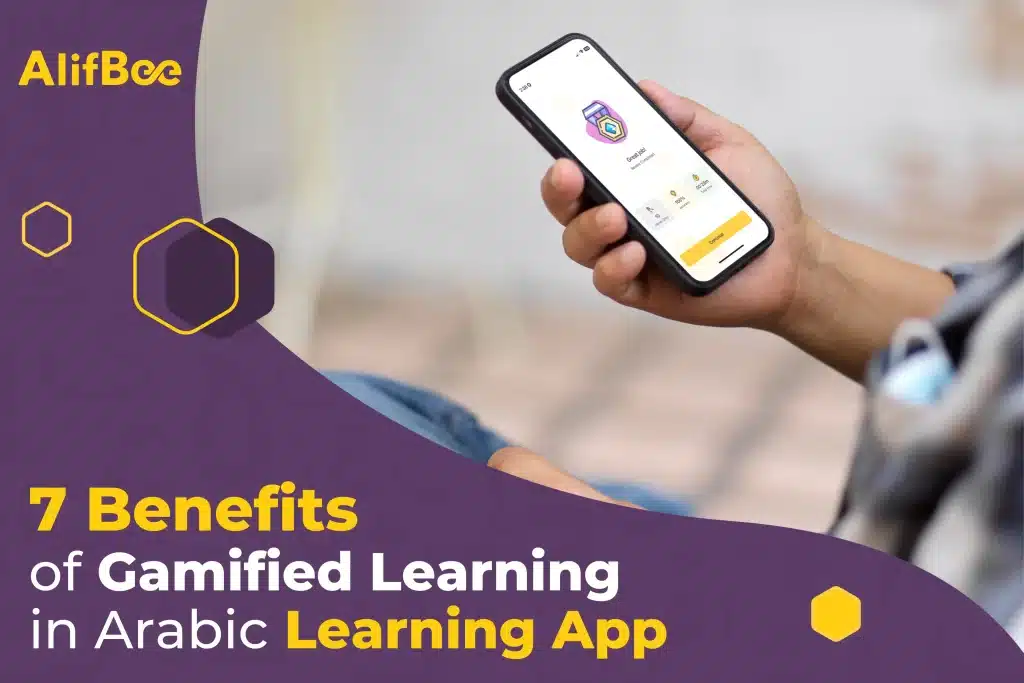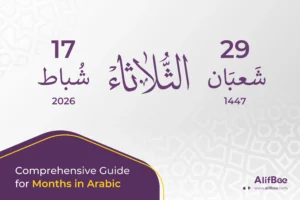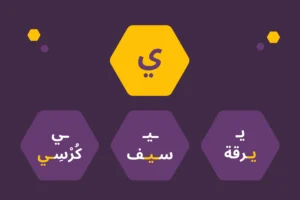
Games don’t just entertain, they recharge your motivation every time you feel bored or tired. To name only a few of the benefits of gamification in language learning, it helps you stay consistent and makes progress feel tangible through earning points, leveling up, and unlocking rewards.
I’m sure you remember how you used to play for hours when you were a child and how it was difficult to interrupt your playing time. Using a language app to learn Arabic is like playing a game in your backyard where every win teaches you actual language skills.
In this article, we will tell you all about the benefits of gamification in education and especially in Arabic language learning. We will focus on 7 prominent advantages you get when you choose to practice a new language through an Arabic learning app.
What are the Benefits of Gamified Learning in Arabic Apps?
1. Motivation and Engagement
We’ve all played some games on our phones, right? You remember that game that kept you excited to reach the next level? These games often have an interesting way to engage users with the content. They include points, rewards, badges, challenges, and prizes to encourage users and keep them motivated all the time while playing.
When it comes to language learning apps, games are a must to support learners’ experience. Game-based Arabic language learning apps usually include rewards and points for users when they complete tasks or answer questions. This feature motivates learners to return to the app repeatedly and unlock new lessons. So every time you complete a challenge or test yourself on something new, you will earn points or prizes, which keeps you engaged in the process and drives you to proceed to the next level.
For example, users may be required to complete a vocabulary or grammar test, and when they achieve a certain score, they earn points, badges, or even get promoted to a higher level in the game.
You can take most of this advantage by aiming to set daily or weekly goals to complete certain challenges in the app. For instance, you can set a goal for passing a new vocabulary test or reaching a certain level, which boosts your interaction and takes your Arabic to the next level.
2. Promoting Self-Learning
Learning Arabic becomes more fun when you follow your personal preferences. You could learn at night or during the day, so it’s completely up to you. This way, self-learning becomes more effective when the app allows its users to choose when and where they want to learn.
In addition, gamification features in language learning apps allows you to determine your progress based on your personal performance, making your experience more self-directed.
For example, let’s say there is a lesson you didn’t fully understand in the app. What do you do in this case? There’s no need to stress out; the app has a feature that allows users to replay levels again to achieve higher scores. Not only that, but you can actually return to lessons if you find them difficult to double down on what you learned.
To improve your skills and advance your self-learning, we recommend regularly reviewing the levels that have been completed and analyzing the mistakes you have made so that you can correct them and take notes for the next challenges.
3. Improving Information Retention
Learning Arabic through games not only improves your level but also enhances your brain’s ability to retain information in the long term. Most games involve repeating tasks in various ways, either through puzzles or daily challenges, and they offer rewards for successfully repeating activities, which motivates learners to always practice the skills.
For example, you are probably wondering right now: how could that really help you? Well, let’s say the app offers a game that contains a set of Arabic words and synonyms. Each time you successfully identify the correct meanings, you are awarded extra points; thus, you’ll be motivated to continuously repeat the recognition of words and their meanings.
Our tip for app users, to enhance information retention, you should practice the acquired language skills periodically, either by testing previously studied words or vocabulary.
4. Enjoy Learning Without the Stress
Learning Arabic doesn’t have to feel like a heavy task or wear you out. Games make it way more fun and something you’ll actually look forward to doing. You’re still learning, but it feels more like playing. You get points, unlock new levels, and keep your streak alive. Those little victories? They make all the difference.
Take quiz games, for example. Lots of apps have them. Try to beat your own high score or challenge other learners. Celebrate your wins!
When you nail a challenge, you’ll score cool badges or unlock some fun rewards. It’s like a little pat on the back that keeps you pumped to jump back in without it feeling like a grind.
Quick tips to keep it fun. Use the app whenever you’ve got a spare moment, maybe during a coffee break, on the bus, or while you’re just kicking back. Pick games that match your skill level: not so easy you’re snoozing, but not so tough you’re pulling your hair out.
5. Learning’s a Blast with Your Buddies
You know what makes learning way more fun? Doing it with others. When you’re playing games with friends, whether you’re trying to beat each other’s scores or working together to solve something tricky, it stops feeling like studying. It’s more like hanging out, laughing, and learning without even realizing it. So, grab your pals, have a good time, and you’ll be amazed at how much you pick up while laughing together!
For instance, a lot of Arabic learning apps let you challenge your friends or join group activities.
Here’s a little tip for you: Make sure to join group challenges whenever you can to make learning more fun.
6. Finding Motivation Through Challenges
Every time you unlock a new level, you feel excited. That’s how you stay engaged.
Think of it this way: you might start with basic vocabulary and simple grammar, and before you know it, the app throws in more complex lessons that keep you alert and intrigued.
Our best advice: Set small, manageable goals, like knocking out one lesson a day or a few each week. Start with small goals you can totally handle—like finishing one lesson a day or a couple each week. Those little wins add up fast, and before you know it, you’re killing it without even breaking a sweat! Maybe aim to finish one level a day or a few each week. That way, you keep moving forward without stress.
7. Acquiring Diverse Language Skills
You might not have heard this before, but gamified Arabic learning apps cover all aspects of language: reading, writing, listening, and speaking. By practicing these skills together, you improve your performance in every aspect of the Arabic language. Our previous blog post Do You Need to Learn to Write Arabic to Speak It explains to you why it’s important to master all four skills.
For example, the app might provide a game that lets people make sentences with new words. It might also have an audio exam to help you improve your listening abilities.
Tips for users: Instead of putting all your energy into one skill, try to work on all four language skills: reading, writing, listening, and speaking. This will make sure that all parts of the language get better at the same time.
These were our top 7 benefits of gamification in language learning. Did you enjoy our blog for today? We hope you did!
Download Our AlifBee App and Let The Fun Begin!
Speak Arabic now with no fear! There are many ways that can help you achieve the dream of speaking Arabic fluently, and using games in apps is an innovative and effective way to reach your goal. There are a lot of benefits of gamification in language learning that make your journey in learning Arabic fun, motivating, and engaging.
Learn Arabic online using our high-quality resources to quickly improve your Arabic.








